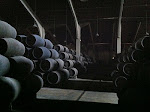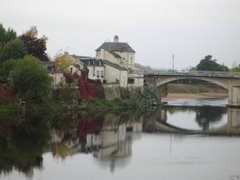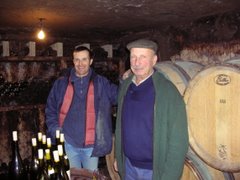A Conversation with Jean-Marie Fourrier - Part 1
Jean-Marie Fourrier of Domaine Fourrier was in town recently for the big La Paulée event and I was honored to spend a few hours talking with him one morning. Fourrier makes wine mostly in Gevrey-Chambertin, and also owns plots in Chambolle and Morey St. Denis. His wines are prized for their incredible purity and transparency, and also for their combination of intensity and grace. I've noticed that when I ask a Burgundy lover to name their favorite producers, Fourrier is on everyone's short list. And this is interesting because although the Domaine is quite old, it is only in the last 15 years or so that the wines have experienced a resurgence in the United States.
I did my very best to record everything faithfully during this interview. I did not use a tape recorder, instead taking careful notes. What follows is a paraphrasing of Jean-Marie's comments during our conversation (and sometimes a paraphrasing of myself, for the sake of condensation).
BG: When you were a kid, were your friends the children of wine growers?
JMF: I grew up in Gevrey-Chambertin, village of 3,000 people. Some of my friends were not involved in wine, and some were. But I didn't ask a lot of questions of people. You know, the trauma of World War II was not that far away. My father was born in 1943 and when he grew up he was told not to talk to his neighbors. His parents would say "This one was cooperating with the Germans, that one didn't want to give us a rabbit when we were starving for food." Everyone stayed private and this really affected the people of my father's generation. It remains with them today.
JMF: Not at all. My dad lost his father when he was 14. He wanted to be a mechanic. At 14, after his father died, he was told "Go make wine with your uncle." All his life he made wine out of obligation, not out of pleasure. He still to this day wished that he could have been a mechanic.
BG: That's hard to imagine.
JMF: He's my tractor driver now, my best employee! He'll be 70 in two years.
BG: So, how did yo get into making wine?
JMF: For my generation, we all had to go to wine school in Beaune in the 1980's. But I wanted to be a pilot, I studied for it. In 1990 there was an economic crisis and the airlines weren't recruiting, so there was no point in continuing. I did one year in the army, it was an obligation in France at the time. I was based in Dijon, I was a truck driver, driving things up north to go to the Air Force during the first Gulf War. When that was finished I worked for my father. He always told me "Do whatever you want, do what you love. Don't come into the wine industry because it's crazy." But I worked for him for two years, and it was a difficult relationship. I decided to work in Oregon for the Drouhins. I wanted to go to the US, to learn English, to get far away from my parents. I stayed for 8 months, lived in Veronique Drouhin's house, used her car, and all that. I was a cellar worker, punching the cap, doing everything like that. I was a trainee. Suddenly, I realized the privilege of having a winery in Burgundy, and it took having some distance from Burgundy for that to happen. I suddenly understood the beauty and the potential of it, I saw where I came from with a different eye.
BG: So you wanted to go back?
JMF: Well, I had become critical of my culture. "The French are always on strike," things like that. I loved the US and I wanted to stay and work here, but if I didn't go back, five generations of business would end, no one would take over. I went home and I wasn't expecting it but my dad really missed me and he said "I've been working here since I was 14 years old. It's your turn now. You are in charge of everything now. Just let me drive my tractor."
BG: So one day you're in Oregon, and the next you've taken over an estate in Burgundy.
JMF: Yes, and it's unusual in Burgundy. Usually the father likes to keep control, and the son inherits the business when he's about 40 years old. I was 23 years old in 1994, my first vintage. I was scared.
JMF: My dad is one of the least diplomatic men you can meet, and the reputation of the wines suffered because of this. Fourrier wines had been imported to the United States for years, but then in 1986 Robert Parker came to visit my father and he said "You should use 100% new oak on your wines." My father kicked him out of the cellar and said to him "My job is to make wine, your job is to taste it, not to tell me how to make it."
BG: That can't have ended well.
JMF: No, it didn't. Parker wrote that Fourrier's is the dirtiest cellar in Burgundy, that the yields are way too high, that the wines are not worth looking at. The reputation suffered and we stopped shipping wines to the US, as no one wanted them. When I took over in 1994 there were five vintages in the cellar! I had to get rid of the stock and make some money, so I sold the wines in supermarkets. I would go in by day and stand there, promoting the wines. I drove to Belgium, a 6 hour drive, tried to sell wine, and drove back the same night to avoid the hotel cost.
BG: You're telling me that you stood in a supermarket next to the cheese and meat displays, probably, pouring Fourrier wine, hoping people would buy it? That is honestly very hard for me to imagine, given the way your wines sell now.
JMF: Yes, but that's exactly what I did in 1994.
BG: So how did things change for you?
JMF: Well, I was good friends with Romain Lignier (wine maker at Domaine Lignier who tragically died of cancer in 2004 at the young age of 34). Romain told me that his US importer was looking for a new supplier in Gevrey-Chambertin, and asked if I would like to receive him. Neal Rosenthal came to visit in 1996 and he tasted the wines and said that the wine was good, but not overly exciting. He was tasting the 1995's. He said that I had potential and that we should start working together with the '95 vintage. This cash allowed me to buy important new equipment, like a cooling system for the vats, better pumps, and I invested in replacing some of the older barrels.
BG: Interesting, why replace old barrels? I thought that you don't use a lot of new oak.
JMF: I don't - I use 20% new oak for all of my wines, from the Villages to the Griottes-Chambertin. But the barrels I replaced were 15 and 16 years old. For each cuvée I try to have one new cask, one 2-year old barrel, one 3-year old barrel, and so on. I like to turnover the casks without imparting oak aromas or flavors to the wine.
BG: Okay, so once you started working with Rosenthal, you invested in new equipment. What happened after that?
JMF: Well, once I could stop worrying about selling my wine, I spent a lot more time making the wine, I did a lot of work in the vineyards. My father always watched what I was doing and noticed any changes I made, and he would ask me about them.
BG: Was there a big change?
JMF: I think so, yes. It started with the 1997 vintage...
To be continued...







7 comments:
Great interview so far. Very interesting indeed, with some Parker drama to boot! I love the wines of Fourrier that I have had, though I fear that they are somewhat too expensive for me to own many. Still, I keep my eyes peeled and I enjoy the villages wine so much. Good thing I suppose, since even those truly stretch my budget!
I love the new interview format. Really starting to set this blog apart....
Wow. Thanks for this-- surrprisingly candid, with great historical perspective in the anecdotes. Sorry I don't know the wines-- *must* make allowance in my budget to explore Fourrier!
Great format. Almost can't wait for the continuation.
Nice interview thus far BG. I would've paid $ to see Jean-Marie's father kick Parker out of his cellar. Looking forward to the second part...
The interview is great and really interesting. I read Neal Posenthal's book a while ago and cannot remember about Fourrier. Nice pics of the gentleman, too.
I agree, great interview and love the new format. Thanks!
Btw, have you guys heard of lovethis? I've started using it to get wine recommendations, pretty useful. Check out my recommendations and I'd be interested to connect with you guys to find some interesting labels and new producers. Here's a link to my profile: http://ow.ly/42A6l.
Keep up the great blog, how do I subscribe?
Post a Comment